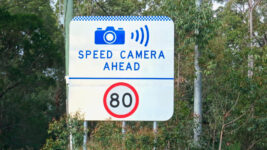Removing Speed Camera Warning Signs: A Cash Cow for the Government

Government revenue from speeding fines has soared since its decision to remove warning signs for speed cameras.
Late last year, the NSW Government decided to remove speed camera signs, to strip back vehicle markings and increase the time police and Transport NSW contractors spend monitoring state roads, a decision that’s proven to be exceptionally lucrative.
Data shows that 32,637 speeding camera fines were issued in January 2020. In January 2021 80,110 fines were issued.
1500 percent increase
And in March 2021, fine for low-range speeding fines increased by more than 1500 per cent.
Figures obtained by the NSW Opposition show that over a six-year period, the number of fines given out in the month of March between 2015 and 2020 ranged from 2,588 to 1,616 but this year in March more than 27,000 fines were issued.
And many of those fines were to drivers doing less than 10km over the speed limit.
In March 2021 the total value of all fines including those for higher-range speeding offences, was more than $6.3 million. Last year it was $478,580.
Making the roads safer?
The NSW Government has always claimed that the changes to mobile speed camera signage would make roads safer, and only time will tell, but the latest Transport for NSW data shows 138 people have died on NSW roads this year compared to 135 this time last year.
The NRMA has argued that the removal of speed camera warning signs has eliminated the opportunity to educate drivers, and won’t necessarily make our roads safer.
As academics and advocates continue to debate whether or not the new policy will reduce the number of speeding offences on our roads, the fact is a lot more drivers could find themselves on the receiving end of a fine with the NSW Government planning to triple the number of hours that roads are monitored.
Contracted mobile speed cameras currently scan NSW roads for 7000 hours a month, and it is understood the government plans to ramp that up to 21,000 hours each month.
What are the rules and penalties for speeding in NSW?
Rule 20 of the NSW Road Rules 2014 states that a driver must not drive at a speed over the speed limit applying to the driver for the length of road where the driver is driving.
The penalties for speeding depend on a number of factors, including:
- The number of kilometres over the speed limit you were travelling,
- The type of vehicle you were driving or riding,
- The type of licence you held,
- Whether double demerits apply, and
- Whether you have previous driving offences
- Whether the case is dealt with by a penalty notice or in court.
Penalties in most cases include fines and demerit points. The law states that demerit points last for 3 years from the date of the offence, but as the law allows for a reasonable period for appeals and general administration, the period is usually in fact 3 years and 4 months.
Contesting your speeding fine in court
If you choose to contest your speeding fine in court, it’s important to remember that courts can impose harsher penalties than those which apply if you pay the penalty notice.
However, a fine will not be imposed if the court uses its discretion to order a Section 10 dismissal or a condition release order without conviction.
Going to court for a traffic offence?
If you are going to court for a traffic offence, call or email Sydney Criminal Lawyers anytime to arrange a free first consultation with an experienced, specialist traffic lawyer who will accurately advise you of your options, the best way forward, and fight for the optimal outcome in your specific situation.







